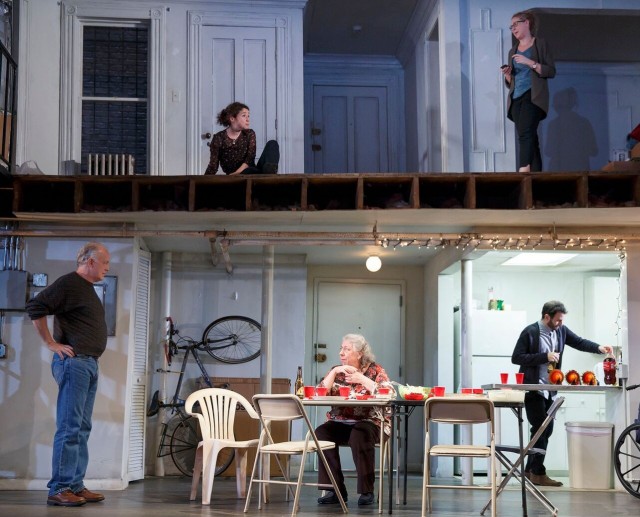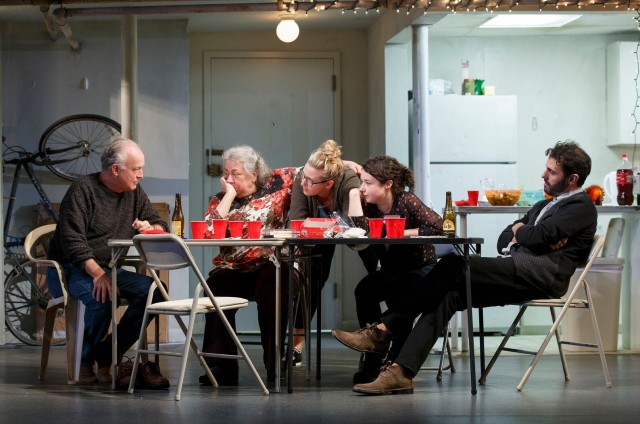
The Blake family gathers in a Chinatown duplex for a Thanksgiving to remember in THE HUMANS (photo by Joan Marcus)
Laura Pels Theatre
Harold and Miriam Steinberg Center for Theatre
111 West 46th St. between Sixth & Seventh Aves.
Tuesday – Sunday through January 3, $99
212-719-1300
www.roundabouttheatre.org
Stephen Karam, a Pulitzer finalist for his widely hailed 2011 play, Sons of the Prophet, should be up for the prestigious prize again for his follow-up, the beautifully told drama The Humans, running at the Laura Pels through January 3, after which it will be transferring to Broadway. The Roundabout commission is a gorgeous, bittersweet portrait of the fears and anxieties that ripple through the average American family in the twenty-first century. On Thanksgiving Day, the Blake clan has gathered at the duplex apartment in Chinatown just rented by Brigid Blake (Sarah Steele), a twenty-six-year-old composer and musician trying to make ends meet as a bartender, and her thirty-eight-year-old boyfriend, Richard Saad (Arian Moayed), a grad student who is preparing the holiday feast. Brigid’s parents, Erik (Reed Birney), who’s worked at the local Catholic high school for twenty-eight years, and Deirdre (Jayne Houdyshell), who has been the office manager at the same company for four decades, have driven into the city from their home in Scranton with Erik’s aged mother, Momo (Lauren Klein), who is suffering from severe dementia and is confined to a wheelchair. They are joined by Brigid’s older sister, Aimee (Cassie Beck), a Philadelphia lawyer who recently broke up with her longtime girlfriend and whose ulcerative colitis is acting up. Brigid and Richard are still in the process of moving in — the truck with most of their possessions is stuck in Queens — so there are some boxes on the floor, not much furniture, and no shades over the lone window, which looks out into a dark alley. But the members of the Blake family soldier on; they are a very close group that hide very few secrets as they talk about their lives, offer love and support, and take both playful and serious shots at one another, as one early exchange shows.

Stephen Karam’s follow-up to sonS OF THE PROPHET is a searing, and funny, portrait of the modern American family (photo by Joan Marcus)
Erik: “I hate that you moved a few blocks from where two towers got blown up and in a major flood zone. . . . I hate that.”
Brigid: “This area is safe —”
Erik: “Chinatown flooded during the last hurricane — it flooded —”
Brigid: “Yeah, that’s why I can afford to live here — it’s not like you gave me any money to help me out.”
Erik: “Wow . . .”
Brigid: “Hey, I’m — sorry, just . . . Chinatown is safe — you saw my block, Dad —”
Deirdre: “Of course it is . . .”
Brigid: “— no one’s going to steer a plane into a, a fish market on Grand Street —”
Aimee: “Brigid . . .”
Deidre: “Let it go . . .”
Erik: “I liked you livin’ in Queens, alright? I worry enough with Aimee on the top floor of the Cira Centre —”
Aimee: “Well, stop, Philly is more stable than New York —”
Brigid: “Aimee, don’t make him more —”
Aimee: “I’m just saying — it’s safer . . .”
Brigid: “Yeah, ’cause not even terrorists wanna spend time in Philly. Philly is awful —”
Aimee: “Oh, ha ha . . .”
Erik: “You think everything’s awful, you think Scranton is awful, but it’s the place that —”
Brigid: “We think it’s awful?!”
Aimee: “Dad, it is!”
Erik: “. . . yeah, well, what I think’s funny is how you guys, you move to big cities and trash Scranton, when Momo almost killed herself getting outta New York — she didn’t have a real toilet in this city, and now her granddaughter moves right back to the place she struggled to escape. . . .”
Brigid: “We know, yes . . . ‘return to the slums . . .’”
No topic is off limits as they discuss finance and economics, bowel movements, cockroaches, the correct pronunciation of Andrew Carnegie’s last name, texting, the odd noises coming from the apartment above, and general quality-of-life issues, but most of all they are searching for a sense of fairness in a world where that ideal is getting harder and harder to come by. Both men, Erik and Richard, are having trouble sleeping, experiencing weird dreams they can’t explain. Momo spits out supposed gibberish that contains such phrases as “You can never come back” and “Where do we go.” Meanwhile, Deirdre is volunteering to help Bhutanese immigrants in Scranton who are mired in poverty, having left a country that measures its success in Gross National Happiness. Scranton native Karam (Speech & Debate, Dark Sisters) is delving into the very nature of the modern-day human condition, which is not very pretty. “There’s enough going on in the real world to give me the creeps,” Deirdre says, leading Brigid to point out Richard’s obsession with a comic book called Quasar. “It’s about this species of, like, half-alien, half-demon creatures with teeth on their backs,” he explains. “On their planet, the scary stories they tell each other . . . they’re all about us. The horror stories for the monsters are all about humans.” Karam’s highly literate script was influenced by Federico García Lorca’s A Poet in New York, which deals with the city’s response to the 1929 economic crash, Sigmund Freud’s 1919 essay, “The Uncanny,” about the strangely familiar, and Napoleon Hill’s six basic fears from his 1937 book, Think and Grow Rich — fear of poverty, criticism, ill health, loss of love, old age, and death — and all six can be found in The Humans.
Two-time Tony winner Joe Mantello (Take Me Out, Assassins) seamlessly directs the real-time story, which takes place on David Zinn’s two-floor tear-away set, like a dollhouse ripped open for us to witness the actual life going on inside. The exquisite cast is just as seamless, each character authentic and believable, led by the always wonderful Houdyshell (Follies, Well) as the excitable, nervous mother, rising star Steele (Slowgirl, Speech and Debate) as the prodigal younger daughter trying to make it on her own, and, front and center at both the beginning and the end of the play, a heartfelt Birney (You Got Older, Circle Mirror Transformation) as the steadfast patriarch, desperate to hold it all together even as things threaten to fall apart, with just a touch of the supernatural hovering as well to complicate matters and to heighten the many terrors of everyday existence. As laugh-out-loud funny as it is heartbreakingly honest, The Humans offers up a Thanksgiving to remember, two spectacularly thought-provoking and entertaining hours that encapsulate the state of the American family in this tough, fearful post-9/11 world.